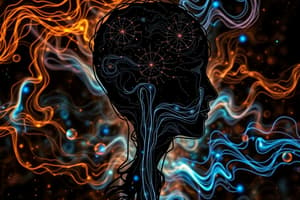Podcast
Questions and Answers
Who developed the theory of analytical psychology?
Who developed the theory of analytical psychology?
Carl Gustav Jung
What is the hallmark of Jungian counseling?
What is the hallmark of Jungian counseling?
- Individual therapy
- Cultural sensitivity (correct)
- Behavior modification
- Group therapy
What are the two levels of the psyche according to Jung?
What are the two levels of the psyche according to Jung?
Conscious and Unconscious
The ____ represents qualities we do not wish to acknowledge and attempt to hide from ourselves.
The ____ represents qualities we do not wish to acknowledge and attempt to hide from ourselves.
What is the goal of individuation in Jungian therapy?
What is the goal of individuation in Jungian therapy?
What does dream analysis aim to do?
What does dream analysis aim to do?
The anima is the masculine part of the female psyche.
The anima is the masculine part of the female psyche.
In Jung's view, _____ is considered the most confusing developmental period.
In Jung's view, _____ is considered the most confusing developmental period.
What is the collective unconscious?
What is the collective unconscious?
Flashcards are hidden until you start studying
Study Notes
Analytical Psychology
- Developed by Carl Gustav Jung, a Swiss psychiatrist
- Was influenced by Jung's personal experiences, dreams, and clinical work
- Integrates disciplines to understand human behavior
- Explores shared symbolism and commonality across humanity
Levels of Psyche
- Conscious - Sensed by ego, includes conscious thoughts and perceptions
- Personal Unconscious - Contains repressed memories, forgotten events, and experiences unique to the individual
- Collective Unconscious - Elements shared by all humans, derived from ancestors
Archetypes
- Archaic images derived from the collective unconscious
- Persona - The mask people present to the world
- Shadow - Represents negative qualities we try to hide from ourselves and others
- Anima - Feminine archetype in the male psyche
- Animus - Masculine archetype in the female psyche
- Self - Archetype of wholeness and integration
Stages of Development
- Childhood - Ruled by primitive urges
- Adolescence - Marked by physical changes, unpredictable behavior, and identity formation
- Middle Age - Reexamination of life, goals, and meaning
- Old Age - Reflection on life experiences and connection to the unconscious
Jungian Therapy
- Focuses on the ego's relationship with the Self
- Aims for self-realization or individuation, which means integrating opposite poles into a whole individual
- Integrates unconscious material into the conscious mind
Techniques and Interventions
- Dream Analysis - Uncovers elements from the personal and collective unconscious to facilitate self-realization
- First Phase - Client describes the details of the dream
- Second Phase - Client shares their feelings and associations with the dream
- Third Phase - Therapist interprets the dream
Studying That Suits You
Use AI to generate personalized quizzes and flashcards to suit your learning preferences.




